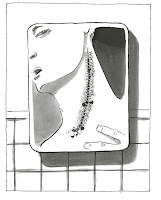Nothing But The Truth by Avi

A lesson in how political schools can be and how things can spin out of control. Originally published in 1991. Normally, I do not read Young Adult (YA) literature, but as a teacher I do delve into it from time to time just to see what's out there. In this case, I picked out this book for purely personal reasons. Nothing But the Truth is all about a misunderstanding and mindless application of a zero tolerance rule in school. The premise is we have a popular, respected and excellent English teacher (Miss Narwin) and a bright student (Phillip Malloy) who does not really apply himself too much. Malloy has been re-assigned to Narwin's homeroom. His previous homeroom had been rather loosely run, but Miss Narwin expects the rules to be followed and the school's written rule is absolute silence during the playing of the National Anthem. Malloy hums loudly during the Anthem (which causes and is directed to stop - something he was allowed to do in his other homeroom. He doe...

















